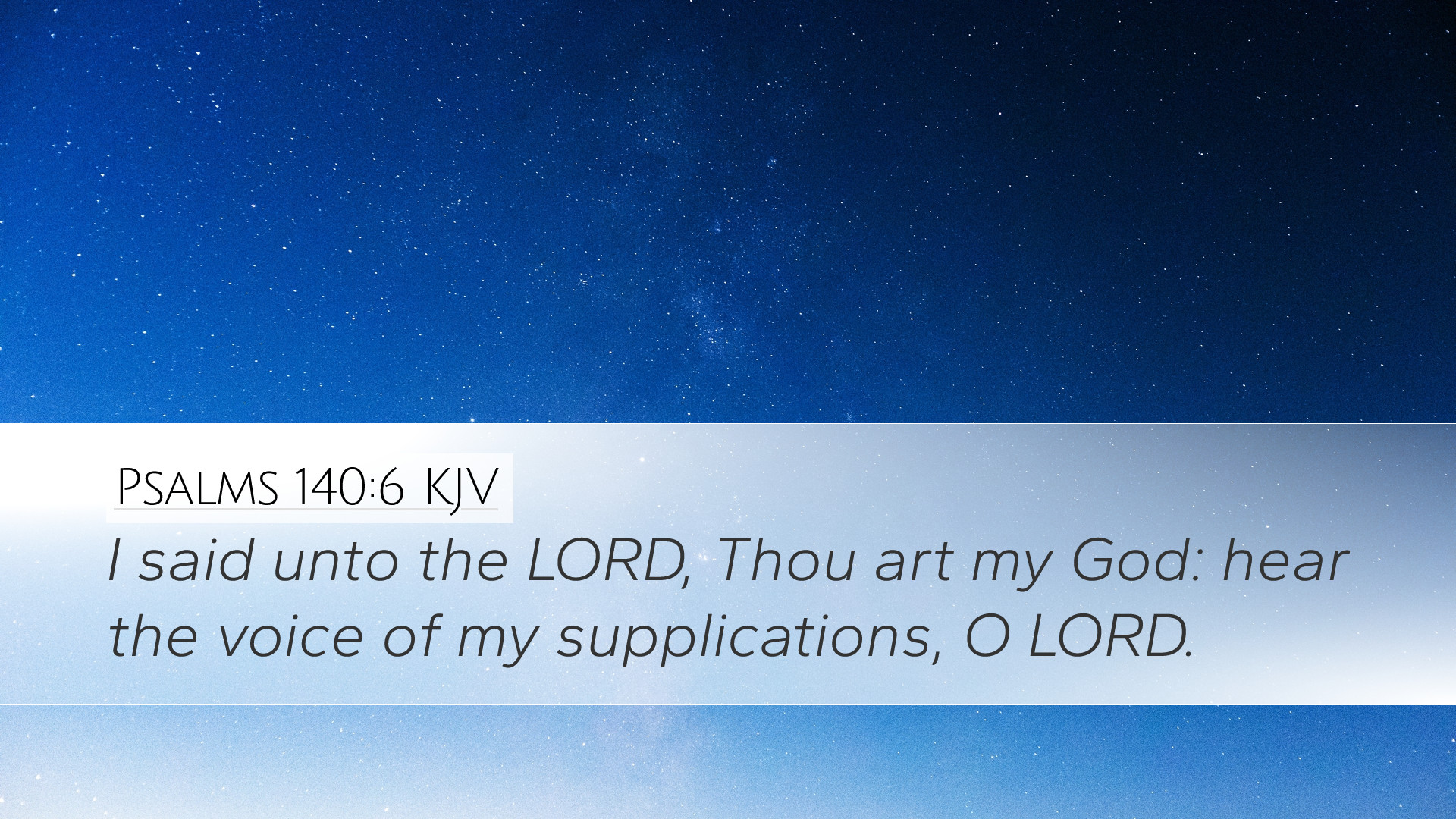Commentary on Psalms 140:6
Psalms 140:6: "I said unto the Lord, Thou art my God: hear the voice of my supplications, O Lord."
Introduction
The verse Psalms 140:6 stands as a poignant moment of earnest supplication. The Psalmist directly addresses God, affirming Him as his personal God and beseeching Him to listen. This is a rich text pregnant with theological significance, containing themes of relationship, dependence, and vulnerability that resonate throughout the Psalms. By examining this verse through the insights of public domain commentators such as Matthew Henry, Albert Barnes, and Adam Clarke, we can glean deeper understanding and application suitable for pastors, students, theologians, and Bible scholars.
The Address to God
Matthew Henry highlights the importance of calling upon God in distress. The phrase "Thou art my God" is a declaration of faith and trust. It indicates a relationship of intimacy and loyalty—recognizing God not only as sovereign but as a personal deity. This personal relationship is essential in prayer; acknowledging God’s lordship while simultaneously appealing to His compassion.
Albert Barnes elaborates that this declaration serves as both a reminder and a reaffirmation of the covenantal relationship—the assurance that the Psalmist is recognized in the divine family. He points out that the use of "my God" encapsulates a personal confession, suggesting a deep spiritual connection that transcends mere formal worship.
Adam Clarke adds that this sentiment underscores a sense of humility. The Psalmist’s self-identification as a supplicant underscores his dependence on God’s mercy, revealing that true strength lies in vulnerability before the Almighty.
The Nature of Supplication
Supplication, as articulated in this passage, is an essential aspect of prayer. The Psalmist invites God to "hear" his voice—a request that is both a plea for attention and an expression of hope. This aligns with the views presented by Henry, who informs us that such a cry reflects the heart of someone fully aware of their need for God’s intervention in life's struggles.
Barnes notes that the act of supplication is not merely about asking; it encapsulates a posture of humility and earnestness. The supplicant acknowledges their need through sincere entreaty, which, according to Clarke, involves an emotional engagement that emphasizes the earnestness of one’s heart before God. Thus, supplication becomes an act of relationship where one desires not only God’s action but also His presence and acknowledgment.
Theological Implications
By recognizing God as "my God," the Psalmist invites deep theological reflection. Henry emphasizes that this assertion is pivotal for understanding one’s identity in relation to God and the world. It frames the believer's prayer as an act rooted in covenant theology, emphasizing the faithfulness of God in the wake of human frailty.
Barnes points out that this form of supplication is reflective of the deep trust placed within God's character—believing not only in His existence but His role as a protector and provider. Understanding this encourages believers to approach God with boldness as they recognize their rightful place in His family.
Clarke mentions that this verse also highlights God’s attentiveness to the cries of His people. It draws attention to the heart of God as one eager to listen and respond. The promise that God hears becomes a source of comfort and assurance, reminding the believer that they are never alone in their struggles.
Practical Applications
The lessons drawn from Psalms 140:6 offer meaningful applications for today's believers:
- Encouragement in Prayer: Believers are urged to approach prayer with confidence, affirming their relationship with God as they present their supplications.
- Building Personal Relationship: The declaration "Thou art my God" serves as a cue to deepen one’s personal relationship with God amidst life's challenges.
- Embracing Vulnerability: Understanding the nature of supplication allows individuals to embrace their vulnerabilities and offer their needs sincerely before God.
- Faith in God's Faithfulness: Recognizing God’s readiness to hear encourages persistent prayer and faith even when answers are not immediate.
- Community Impact: In communal worship, this verse serves as a reminder for the collective responsibility of intercession, supporting one another in supplication.
Conclusion
Psalms 140:6 captures the essence of approaching God in prayer. The rich insights offered by Matthew Henry, Albert Barnes, and Adam Clarke illuminate the depth of relationship inherent in this passage. This small but powerful verse urges believers to engage authentically with God, affirming His lordship while relying on His mercy. As pastors, students, and theologians encounter this text, it serves as a foundation to understand the profound invitation to dialogue with the Creator, who is both sovereign and intimately concerned with the cries of His children.


